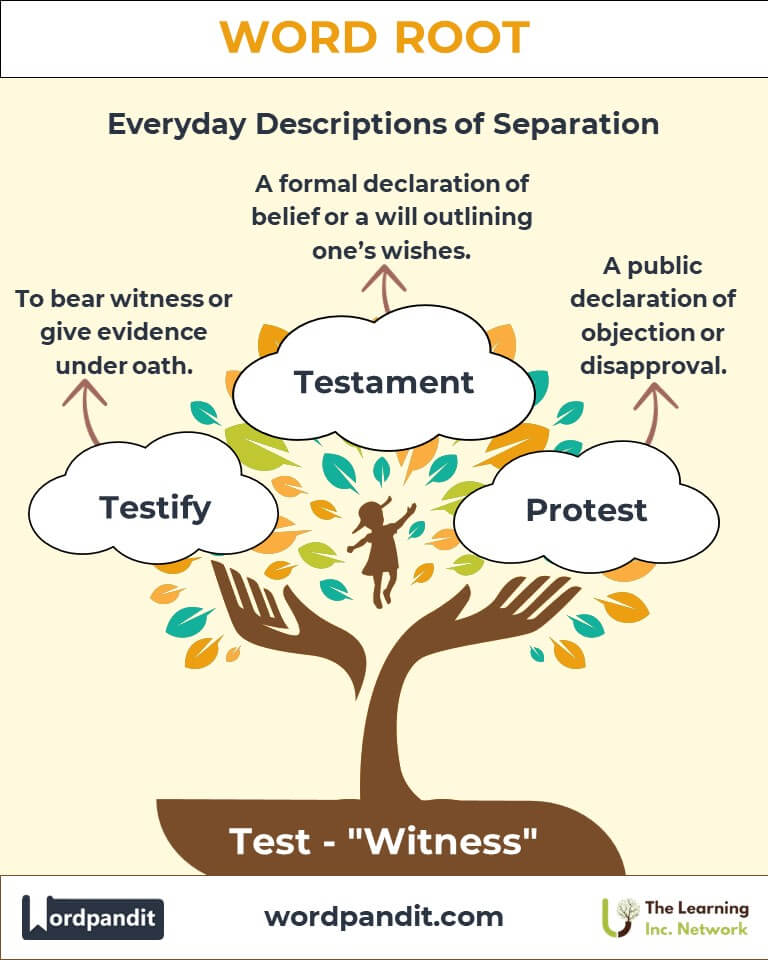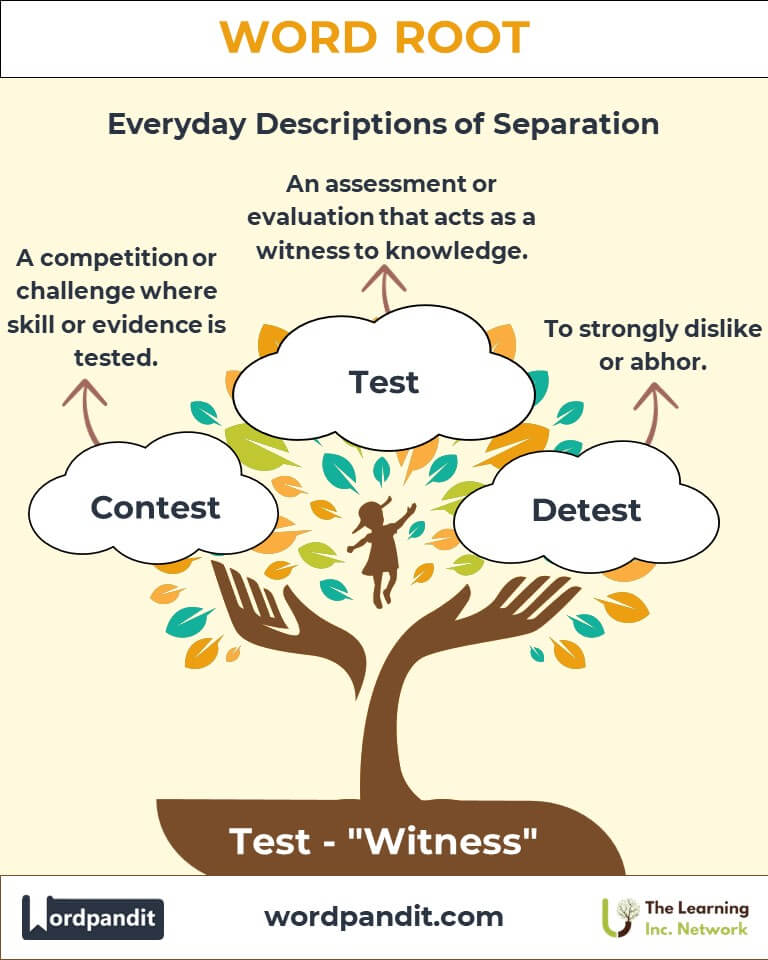Test: The Root of Witness in Law and Language
Byline: Discover the fascinating journey of the root "test," meaning "witness." From the solemnity of testifying in court to the enduring legacy of testaments, this root has shaped our understanding of truth, faith, and evidence.

Table of Contents
- Introduction: The Essence of "Test"
- Etymology and Historical Journey
- Mnemonic: Unlocking the Power of "Test"
- Common "Test"-Related Terms
- "Test" Through Time
- "Test" in Specialized Fields
- Illustrative Story: "Test" in Action
- Cultural Significance of "Test"
- The "Test" Family Tree
- FAQs About the "Test" Word Root
- Test Your Knowledge: "Test" Word Root Quiz
- Conclusion: The Living Legacy of "Test"
1. Introduction: The Essence of "Test"
The root "test," derived from Latin, embodies the act of witnessing or bearing evidence. Pronounced "test," this powerful root has influenced words related to truth-telling, legal processes, and declarations of faith. Its relevance extends from courtrooms to spiritual practices, reflecting the enduring importance of integrity and evidence.

2. Etymology and Historical Journey
The root "test" originates from the Latin testis, meaning "witness." In ancient Rome, testis referred to a third-party witness in legal matters. Over time, it evolved into testamentum, denoting a formal declaration or will. This linguistic journey highlights its foundational role in affirming truth and documenting significant events.
3. Mnemonic: Unlocking the Power of "Test"
To remember "test" as a witness, picture a courtroom where a witness takes the stand to testify, holding a Bible or other symbol of truth.
Mnemonic Device: "Test is the testimony of truth, where witnesses stand to attest."
4. Common "Test"-Related Terms
- Testify (tes-ti-fy):
- Definition: To bear witness or give evidence, often under oath.
- Example: "She testified in court about what she saw on the night of the incident."
- Testament (tes-tuh-ment):
- Definition: A declaration of belief or a will outlining one's wishes.
- Example: "The New Testament is a cornerstone of Christian faith."
- Contest (kon-test):
- Definition: A competition or challenge where evidence or skill is tested.
- Example: "The talent contest showcased amazing performers."
- Protest (pro-test):
- Definition: To publicly express objection or disapproval.
- Example: "Citizens gathered to protest against the new law."
- Detest (de-test):
- Definition: To strongly dislike or abhor.
- Example: "He detests dishonesty in any form."
5. "Test" Through Time
- Testamentum: In medieval Europe, legal wills were called "testaments," symbolizing a person's final witness to their intentions.
- Protest: Originally meaning "to declare publicly," it evolved into an act of objection during the Reformation and beyond.
6. "Test" in Specialized Fields
- Law:
- Testify: Crucial in legal proceedings, ensuring truth and fairness.
Example: "The eyewitness testified about what occurred on the day of the crime."
- Testify: Crucial in legal proceedings, ensuring truth and fairness.
- Religion:
- Testament: Represents sacred agreements, such as the Old and New Testaments of the Bible.
Example: "The Old Testament is foundational to many religious traditions."
- Testament: Represents sacred agreements, such as the Old and New Testaments of the Bible.
- Education:
- Test: Assesses knowledge, acting as a metaphorical witness to learning progress.
Example: "The math test evaluated students' understanding of algebra."
- Test: Assesses knowledge, acting as a metaphorical witness to learning progress.
7. Illustrative Story: "Test" in Action
During a high-profile trial, Maria, an eyewitness to a crime, was called to testify. Her truthful account, based on what she had witnessed, became the cornerstone of the case, ensuring justice. Meanwhile, her personal testament—a letter to her family—highlighted her unwavering belief in doing what was right, showcasing the dual significance of "test."
8. Cultural Significance of "Test"
The concept of witnessing truth resonates deeply across cultures. From solemn oaths in courtrooms to spiritual testaments, the root "test" underscores humanity's commitment to integrity, legacy, and accountability.

9. The "Test" Family Tree
- Mon (Latin: "warn, advise"):
- Admonish: To warn or reprimand.
Example: "The teacher admonished the students for their tardiness." - Monitor: To observe and guide.
Example: "The nurse monitored the patient’s condition overnight."
- Admonish: To warn or reprimand.
- Vid/Vis (Latin: "see"):
- Evidence: Proof that is seen or observed.
Example: "The photograph served as crucial evidence in the case." - Vision: The act of seeing.
Example: "Her vision for the project inspired the whole team."
- Evidence: Proof that is seen or observed.
- Cred (Latin: "believe"):
- Credence: Belief or acceptance.
Example: "The scientist’s findings lent credence to the new theory." - Credible: Worthy of belief.
Example: "The witness provided a credible account of the events."
- Credence: Belief or acceptance.

10. FAQs About the Test Word Root
Q: What does "test" mean?
A: The root "test" means "witness" or "to bear evidence," derived from the Latin testis. This root underpins words associated with legal, religious, and evaluative contexts, emphasizing the act of observing, affirming, or declaring truth.
Q: How is "testify" related to the word root "test"?
A: "Testify" comes from the Latin testificari, meaning "to bear witness." It reflects the practice of providing evidence or proof, often under oath, in courtrooms or other formal settings. The word signifies a direct act of witnessing and affirming truth.
Q: What is the significance of "testament"?
A: "Testament" originates from testamentum, a Latin term for a will or covenant. It signifies a formal declaration, often of one's beliefs or wishes, as seen in religious scriptures like the Old and New Testaments or in legal documents outlining a person’s final wishes.
Q: Is "protest" connected to the root "test"?
A: Yes, "protest" initially meant "to declare publicly or bear witness." Over time, its meaning evolved to describe an act of objection or disapproval, often involving public demonstrations to voice dissent against perceived injustices.
Q: What does "detest" mean, and how does it relate to "test"?
A: "Detest" means to strongly dislike or abhor. Its connection to "test" lies in the figurative sense of witnessing something that evokes such strong negative feelings that it is rejected or shunned.
Q: Why is "test" significant in religion?
A: In religious contexts, "test" underpins the concept of affirming faith or agreements with divine authority, as seen in the Old and New Testaments. These are metaphorical "witnesses" to sacred covenants between God and humanity.
Q: How does "test" relate to education?
A: In education, a "test" acts as a witness to a student’s knowledge or proficiency. By answering questions or solving problems, the student provides evidence of learning and mastery over a subject.
Q: What is the historical significance of "testamentum"?
A: "Testamentum" was used in Roman law to describe legal documents, particularly wills. Its usage expanded to religious texts, symbolizing divine agreements, and to broader contexts where formal declarations were important.
11. Test Your Knowledge: Test Mastery Quiz
1. What does the root "test" mean?
2. Which word means "to give evidence under oath"?
3. What does "testament" signify in religious contexts?
4. Which word describes strong dislike?
5. What is a "test" in education?
12. Conclusion: The Living Legacy of "Test"
The root "test" exemplifies the enduring importance of truth and witnessing across languages and cultures. Whether in a court of law, a declaration of faith, or an educational exam, it serves as a cornerstone of integrity and accountability. As we navigate the complexities of the modern world, the root "test" reminds us of the timeless value of evidence and belief.














